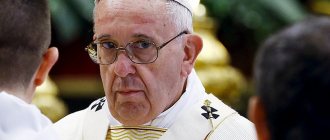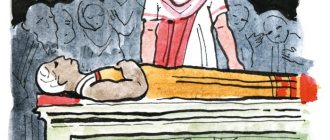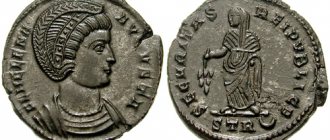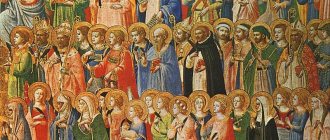Gaius Aurelius Valerius Diocletianus (lat. Gaius Aurelius Valerius Diocletianus, birth name - Diocles (lat. Dioclus); December 22, 244, Dalmatia - December 3, 311, Salona) - Roman emperor from November 20, 284 to May 1, 305 . The rise to power of Diocletian ended the so-called crisis of the third century in Rome. He established firm rule and eliminated the fiction that the emperor was only the first of the senators (princeps), after which he declared himself the absolute ruler. With his reign, a period in Roman history began, called the Dominate.
Diocletian was born around 245 in the vicinity of Skodra in the town of Diocletia (now the territory of Montenegro) and came from the lower social strata (his father was a freedman). Thus, the Roman Emperor Diocletian was the grandson of a slave. Timothy Barnes considers Diocletian's birth date to be December 22. His name was Diocles (or Valery Diocles), which, after becoming emperor, he changed to a more sonorous one - Diocletian. Having entered military service as a simple soldier under Gallienus, he quickly climbed the career ladder, and while making campaigns from one end of the Roman Empire to the other, he became acquainted with the state of affairs in the state. While in Gaul with his legion, he, according to legend, received a prediction from one Druid that he would become emperor if he killed a boar (Latin aper). Under Probus he was already governor of Moesia. When Emperor Carus went to war with the Persians, Diocletian accompanied him as commander of the domestics (Latin comes domesticorum). When Kar, on the other side of the Tigris, suddenly died, and his son, Numerian, who was with him, was treacherously killed by his father-in-law, the praetorian prefect Arrius Aprus, on the banks of the Bosphorus, in Chalcedon, the soldiers shackled Aprus, and their commanders proclaimed Diocletian emperor. (September 17, 284).
Emperor Diocletian, 3rd century AD
Start of reign
Diocletian began a new era in the Roman Empire, making imperial power not only de facto, but also de jure unlimited - absolute monarchical power (dominant). The Emperor no longer shares it at all with the Senate; he himself is the source of all power, he is above all laws, all inhabitants of the empire, no matter what their rank.
The first act of the new emperor was to personally kill Apra in front of the army. He did not touch any of his enemies, confirmed them in positions and, having defeated Carinus, another son of Emperor Carus, in Moesia, he even surprised his contemporaries with his meekness, which was not at all common in Rome among the victors in internecine wars. The victory over Karin restored the unity of the empire; but since the circumstances were difficult, Diocletian took his old friend Maximian as his assistant, giving him first the title of Caesar, and after he suppressed the peasant uprising of the Bagaudas in Gaul (285) - the title of Augustus (286). While Maximian defended Gaul from the Germans, Diocletian was busy in the east; ensuring the security of the empire's borders in Asia and Europe. First, from Nicomedia, where he was at the end of 285 - beginning of 286, Diocletian moved to Syria to arrange affairs with Persia; when circumstances in the East took a turn favorable for Rome, he turned from Asia to Europe in order to protect the Danube line from attacks by the Sarmatians. He managed to defend the former border along the Danube - (Dacia) and secure the province of Raetia behind Rome. The emperors postponed their triumphal arrival in Rome, but each adopted a new epithet: Diocletian began adding lat. Jovius (Jupiter), and Maximian - lat. Herculius (Hercules). Having defeated the Saracens (Arabian Bedouins) who were ravaging the borders of Syria, Diocletian returned to Europe again (at the end of 290).
The division of the empire into four parts led to the transformation of the entire provincial government. The empire was fragmented into a large number of administrative districts. The entire empire was divided into 12 dioceses, each of which was divided into provinces: the smallest, Britain, into four provinces, and the largest, Oriens, into 16. This structure of government required an increase in the number of officials, which accordingly led to an increase taxes of the population. However, this reform corresponded to the needs of the time and was retained after Diocletian.
Roman Empire during the reign of Diopletian
Internal administration
To solve the problem of internal military conflicts, Diocletian decided to double the number of provinces to one hundred and unite them into twelve dioceses, headed by vicars who did not have military education.
This decision changed the internal boundaries of the provinces, making uprisings impossible.
A military reform was also carried out: mercenaries in the army were replaced by recruits, which were provided by the landowners of these regions.
As the center of the empire, along with the emperor, moved from Rome to the east, many members of the Senate in Rome lost their influence on administrative decisions. So gradually the Senate ceased to take part in the most important affairs of the empire.
Tetrarchy
At the beginning of 291, at a meeting in Milan with Maximian, who arrived there from Gaul, it was decided to elect two Caesars, and the choice fell on Constantius Chlorus and Galerius Maximian. The attraction of two new persons to imperial power was caused by the fact that with constant wars and disturbances in different parts of the state, the two emperors did not have the opportunity to manage affairs in remote parts of the empire. To strengthen their mutual connection with the new emperors, Diocletian and Maximian enter into close kinship with them: Constantius, having divorced Helen, Constantine’s mother, marries Maximian’s stepdaughter Theodora and receives control of Gaul and Britain; Galerius, having also divorced his former wife, marries Diocletian’s daughter Galeria Valeria and receives control of all of Illyria. Specifically, Maximian, in addition to general supervision of the entire West, was given responsibility for Italy, Africa and Spain. The regions to the East of Italy remained under the care of Diocletian. At the same time, he attracted 18-year-old Constantine, Constantius’s son from Helen, who followed him everywhere on his campaigns in the East. The solemn accession of the two Caesars to imperial power took place on March 1, 293. The division of regions for administration was not so much a division of the empire itself as a simplification of labor in administration, at the head of which, at least morally, Diocletian still stood.
Coin of the Follis of Dioctetiana, 3rd century AD.
Army
| Emperor Diocletian, image on a coin |
Diocletian strengthened the army, increasing its number through recruitment to 450 thousand people.
One part of the legions was constantly stationed in certain border areas, the other was transferred as needed. Diocletian brutally suppressed the uprisings of the masses and separatist movements in the provinces: in 285-286 - the Bagaudians in Gaul, in 290 - the Moorish tribes in Africa, in 294-295 - the usurper Achilles in Egypt, in 297 - the usurper Carausius in Britain. Diocletian and his co-rulers repelled the invasions of the Carp and Iazyge tribes on the Danube, the Franks and Alamanni on the Rhine, and led successful campaigns against the Persians (in 286-287 and 296-298), as a result of which the Romans strengthened their influence in Armenia and Iberia and captured part of Mesopotamia .
Restoration of the Empire
One of the new emperors immediately had the difficult task of taking Britain away from the usurper Carausius, whom until then Diocletian and Maximian had to endure unwillingly, which Constantius managed to achieve, as well as the calming of Gaul. Maximian had to defend the Rhine borders from German invasions (296), and the following year he had to pacify the Moors in Africa. It fell to Galeria to defend, under the main leadership of Diocletian himself, the border on the lower Danube, where the Iazyges, Carps, Bastarnae and Jutungi gave the Roman troops a lot of work. Having established calm in the European East, Diocletian had to go to Egypt, which was at that time in the hands of the usurper Achilleus.
After an eight-month siege, Diocletian captured Alexandria in 298. At the same time, Diocletian took measures to more conveniently govern Egypt, dividing it into three provinces (Thebaid, Aegyptus Jovia and Aegyptus Herculia), and to win over the masses to the side of the Roman government by distributing grain to the poor residents at public expense. A strange edict dates back to this same time, which commanded that all the ancient books that taught how to make gold and silver be collected and burned. This was explained by Diocletian’s desire to destroy the source of wealth, and at the same time the arrogance of the Egyptians.
Finally, by means of a treaty with the Blemmyae and Nobates, he secured the southern border of Egypt from the attacks of these barbarian tribes, promising to pay them an annual tribute. During the Egyptian campaign, he instructed Galerius to go to Mesopotamia against the Persians, who at that time were fighting with the pretender to the independent Armenian throne, Tiridates, protected by the Romans. Galerius failed and fled to Diocletian, who was coming from Antioch to the aid, who, as punishment, forced him to walk a whole mile in purple behind his carriage. Galerius's second campaign was more successful. He utterly defeated the Persians in Armenia and forced them to cede five provinces to the Romans on the other side of the Tigris (297).
In 303, Diocletian began a persecution of Christians, which resulted in many martyrs. The emperor ordered the churches to be closed and books destroyed.
He was least fortunate in his concerns about maintaining paganism as a state religious system and in the fierce struggle against Christianity. In the very year of his death, the edict of Constantine the Great granted the right of free conversion to Christianity to anyone who wished. The assessment of the personality and activities of Diocletian is different among pagan and Christian writers. But pagan writers also reproach him for introducing oriental pomp into court etiquette and for the arrogant halo with which he surrounded the person of the Roman emperor, demanding that they prostrate before him, and appearing before his subjects like a deity. A tangible monument to his activity remains in Rome the colossal ruins of the Baths of Diocletian, built, according to legend, by Christians condemned to death.
Diocletian and the Christians
In addition to other problems in the vast empire, Diocletian was worried about the growth of the number of Christians and their influence on the Romans.
He wanted to return to the traditional belief in gods, and also imagined himself to be a god, so persecution began against Christians.
The emperor ordered the destruction of Christian churches and texts.
During this Great Persecution, any Christian who refused to make sacrifices to the Roman gods was killed or subjected to terrible torture.
Results
Thus, peace was gradually restored both within and on the borders of the state, which had not happened in the empire for a long time. The time of Diocletian was therefore hailed by contemporary rhetoricians as the return of the golden age. After twenty tense years, the emperor finally appeared in Rome, but the stinginess of the entertainment he gave to the people aroused universal ridicule. Soon Diocletian left Rome and went to his favorite residence, Nicomedia. On the way, he fell ill and, on the urgent advice of Galerius, solemnly renounced power in Nicomedia on May 1, 305. Galerius and Constantius received the title of Augustus, and Severus and Maximin were elevated to Caesar.
Diocletian spent the rest of his life in his homeland in Illyria, on his estate in Salona, where he lived in solitude for 6 years. The former emperor refused the attempt of Maximian and Galerius to convince him to return to power, noting, among other things, that if they had seen what the cabbage he grew was like, they would not have pestered him with their proposals. Diocletian's last years were marred not only by physical suffering, but also by the rudeness of the new rulers (especially Constantine) towards him. Diocletian died under unknown circumstances (according to Aurelius Victor - from poison, according to Lactantius - from hunger and depression, according to Eusebius - after a long illness and from senility) in 311.
Economic reforms
Diocletian streamlined taxation by establishing a direct land-capitation tax in kind, which reflected the naturalization of the economy; tried to improve finances by introducing a full-fledged coin; fought against speculation by issuing an edict on prices in 301.
Diocletian extended the power of the land magnates over the dependent population and at the same time made them responsible for collecting taxes and for supplying recruits; issued a number of edicts in favor of small and medium-sized landowners (providing, in particular, for the termination of the purchase and sale of lands previously sold for next to nothing).
Diocletian and Christianity
| Emperor Diocletian |
The first nineteen years of his reign were marked only by martyrdom among the soldiers, because the soldiers continually refused to make the required sacrifices to the gods, and for this they were executed.
Christians felt so calm that even opposite the emperor's palace in Nicomedia, a large Christian church stood. But at the end of his reign, under the influence of Galerius, Diocletian resumed the brutal persecution of Christians. Over the course of one year 303-304, one after another he issues as many as four edicts (decrees) against Christians, and these edicts predetermine the ever-increasing scale of persecution.
First, the confiscation of church property occurs [1]. First of all, church buildings were confiscated. In addition, the clergy were required to issue sacred vessels and sacred books. One of the bishops was glad that he had deceived the persecutors, and instead of sacred books, he gave them heretical books, which he kept for information. But incomparably more often the situation was more acute, because those who did not hand over sacred books and vessels were subjected to repression, and those who did were considered fallen - the Church judged this quite strictly. By the way, during the Diocletian persecution, incomparably more Christian books were destroyed than subsequently, in the Christian era, pagan books - according to the verdict of church courts, because the pagan books destroyed by Christians can be counted on the fingers of one hand, while the pagans destroyed generally all Christian books.
The persecution developed further, and soon moved from the confiscation of shrines and church property to arrests and executions of the clergy. Every single clergy person was subject to persecution: not only bishops, but also all lower clergy, of whom there were very many at that time, because there was no firm boundary between clergy and ordinary church employees: for example, gatekeepers in churches, or orderlies who served church hospitals and almshouses were also considered clergy. All Christians were forced to return to paganism, and protesters were subject to torture.
Not all parts of the empire were equally affected by persecution. In that part of the empire ruled by Constantius Chlorus (Gaul and Britain) there were relatively few Christians, and the persecution here, due to the fact that Constantius himself sympathized with Christianity, was of the most superficial nature. They were limited to the confiscation of buildings, and this confiscation was not at all universal. In the east, where there were significantly more Christians, the persecution was much bloodier. The history of Christianity has never known such terrible persecution.
Among the martyrs who suffered were Diocletian’s wife and youngest daughter, Alexandra and Artemia, who were secret Christians.
Literature
- Bernhardt, “Geschichte Roms von Valerian bis zu Diocletians Tode” (B., 1867);
- Preuss, “Kaiser D. und seine Zeit” (Lpts., 1869);
- Bernhardt, “Untersuchung über Diocletian im Verhältniss zu den Christen” (B., 1862);
- Mason, "The Persecutions of D." (L., 1876);
- Allard, “La persécution de D. et le triomphe de l'Eglise, d'après les documents archéologiques” (Par., 1890);
- Belser, "Zur Diocletianischen Christenverfolgung" (Tübingen, 1891);
- Casagrandi, "Diocleziano" (Gen., 1876);
- Cohen, "L'abdicazione di D." (1887);
- Morosi, “L'abdicazione dell'imp. D." (1880).
- Prince I. Emperor Diocletian and the decline of the ancient world. - Aletheia, 2010. - 144 p. - (Ancient Library. Research). — 1000 copies. — ISBN 978-5-91419-310-9.
- Stephen Williams. Diocletian. Restorer of the Roman Empire / Translator Irina Khazanova. - M.: Eurasia, CLIO, 2010. - 368 p. - (Clio). — 2000 copies. — ISBN 978-5-91852-058-1, 978-5-906518-17-0.
- Novitskaya K.I., Some issues of agrarian policy at the beginning of the Dominat, “Bulletin of Ancient History”, 1961, No. 4;
- Arkhangelsky S.I., Diocletian’s Decree on Taxes, Nizhny Novgorod, 1928;
- Seston W., Dioclétien et la tétrarchie, P., 1946.
- Diocletian // Encyclopedic Dictionary of Brockhaus and Efron: in 86 volumes (82 volumes and 4 additional). - St. Petersburg, 1890-1907.









